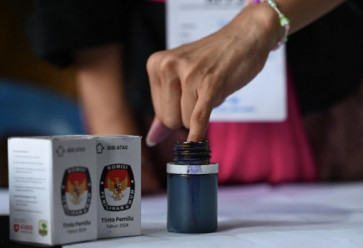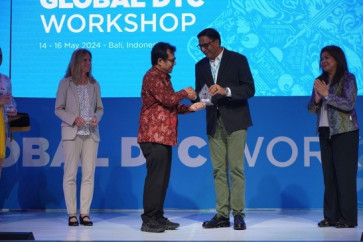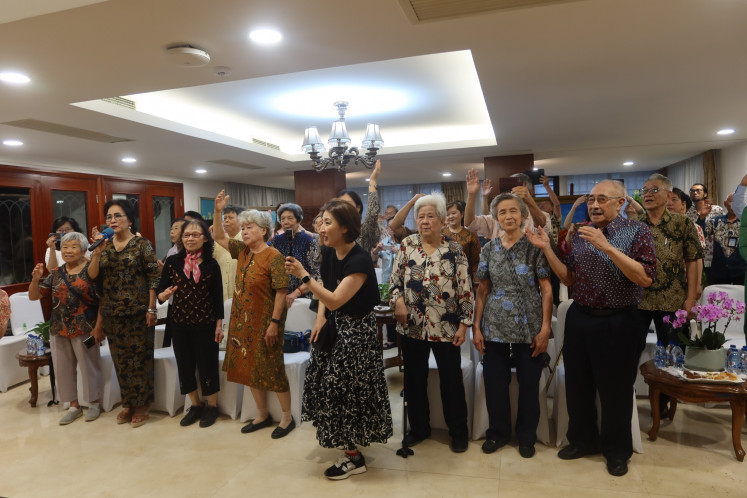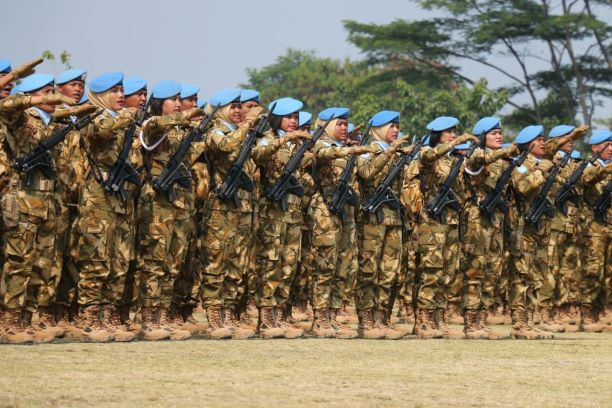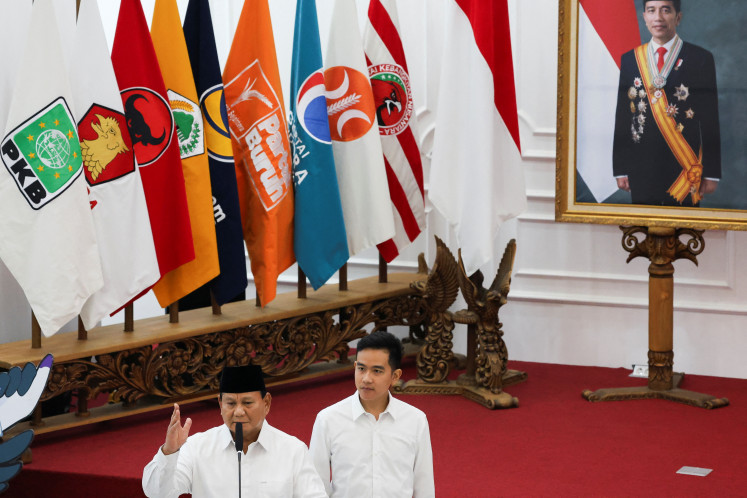Analysis: NasDem Party, PKB join Prabowo, wait for rewards
Change Size
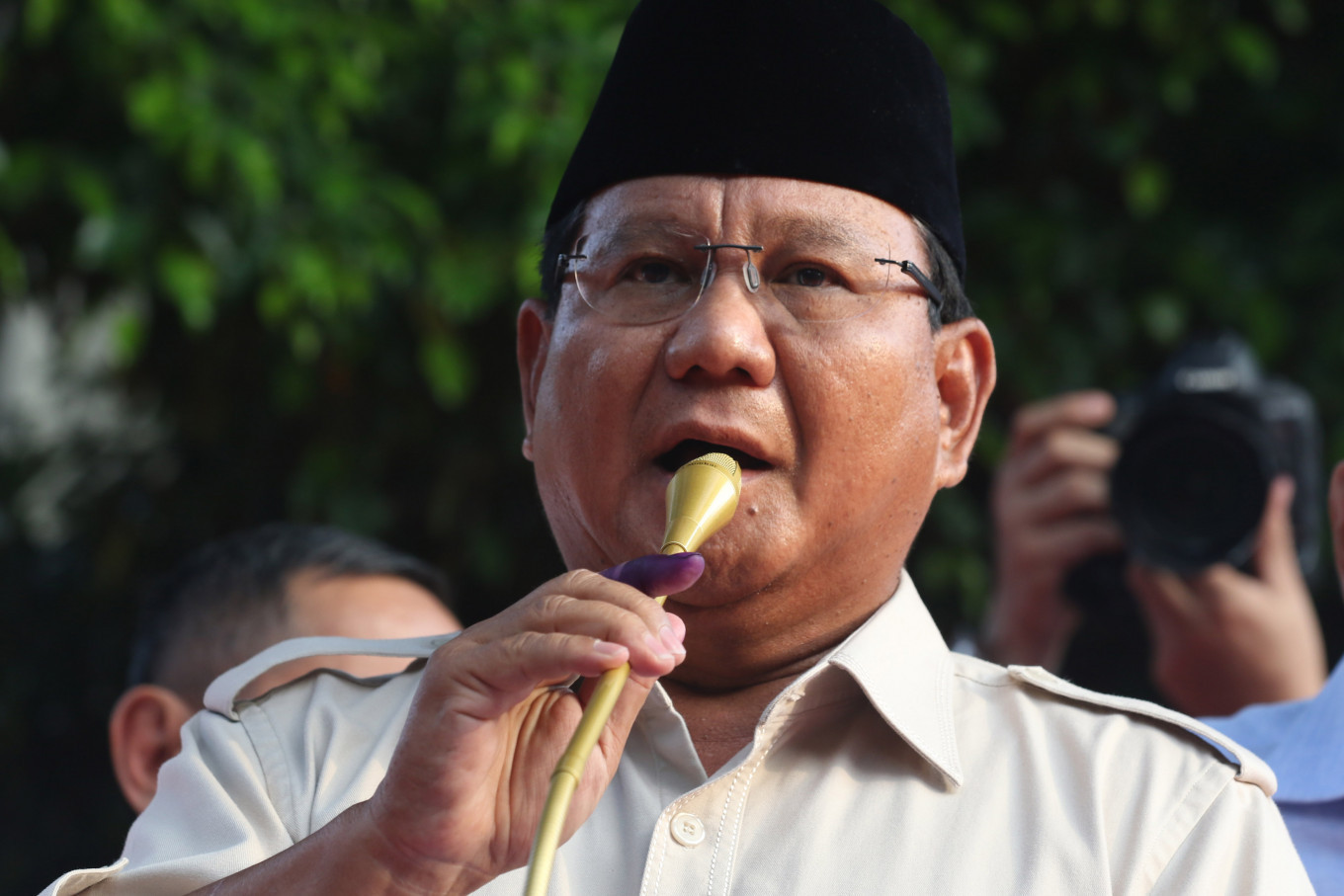 Presidential candidate Prabowo Subianto claims victory at his house in Jakarta on April 17, just hours after polling stations closed nationwide. (JP/Dhoni Setiawan)
Presidential candidate Prabowo Subianto claims victory at his house in Jakarta on April 17, just hours after polling stations closed nationwide. (JP/Dhoni Setiawan)
T
he National Awakening Party (PKB) and the NasDem Party, two parties that nominated Anies Baswedan in the Feb. 14 presidential election, have decided to join the winning side of Prabowo Subianto. The entry of the two ex-rivals will allow Prabowo to enlarge his coalition and secure majority parliamentary support, but on the flip side it may cause complexities in allocating ministerial posts as rewards in his incoming cabinet.
PKB chairman Muhaimin Iskandar, who ran as a vice presidential candidate with Anies, and NasDem chairman Surya Paloh announced on separate occasions that the two parties were ready to support Prabowo's administration. The announcement followed their meetings with Prabowo after the Constitutional Court upheld the latter's election win.
The PKB and NasDem are among the top five political parties in the incoming House of Representatives, with 10.62 and 9.66 percent of popular votes, respectively. Having the PKB and NasDem would allow Prabowo's Indonesia Onward Coalition to increase its national votes in the House from 43.18 to 63 percent. Prabowo indeed needs the PKB as it represents Muslim constituents and the Nahdlatul Ulama (NU), the biggest Islamic organization. Before the PKB's deal, Prabowo lacked Islamic credentials, even though his loyal ally the National Mandate Party (PAN) has a strong connection with Muhammadiyah, the country's second largest Islamic group.
PKB executive Jazilul Fawaid asserted that the PKB's support for Prabowo was not conditional. He said the party, for example, would allow Prabowo to fully exercise his prerogative to appoint his cabinet ministers. Surya, meanwhile, said there were no talks about ministerial posts allocated for NasDem during his encounter with Prabowo. So far, there have been no objections from Prabowo's original coalition members, the Golkar Party, the Gerindra Party, PAN and the Democratic Party, about expanding the coalition, even though each of them has an interest in securing a particular number of ministerial seats as a logical consequence of Prabowo's election win. Nevertheless, it might be too early to predict the impact of the latecomers' arrival on the coalition that is relishing its victory. Prabowo has yet to begin talks on his cabinet formation even though the General Elections Commission confirmed him and his running mate Gibran Rakabuming Raka as president-elect and vice president-elect respectively on April 24.
Traditionally, parties with a large number of seats in the House would ask for more seats in the cabinet than those with a lower number of seats. Golkar, through its chairman Airlangga Hartarto, has claimed that it deserves at least five ministerial posts in the incoming administration, being the second-largest party in the House after the Indonesian Democratic Party of Struggle (PDI-P).
The Democrats and PAN should be worried about the PKB and NasDem joining the coalition, as the former two control fewer House seats than the latter two. The Democratic Party only secured 7.43 percent of the vote, while the PAN 7.24 percent in the legislative election. Democratic Party chairman Agus Harimurti Yudhoyono, who is also the current agrarian and spatial planning minister, declined to respond to the entry of the PKB and NasDem to the coalition.
What’s More
In designing his incoming administration, Prabowo needs to consider the views of his coalition members, both old and new. He should also reward coalition members that failed to win legislative seats, such as the Indonesian Solidarity Party (PSI), the Gelora Party, the Crescent Star Party (PBB), the Garuda Party, Prima Party and most recently the United Development Party (PPP).
Besides, Prabowo also needs to consider other influential groups, such as ProJo, one of the volunteer organizations supporting Joko "Jokowi" Widodo's presidency. The group, led by Communication and Information Minister Budi Arie Setiadi, played a significant role in helping Prabowo-Gibran win the presidential election.
There are also figures affiliated with President Jokowi, such as Budiman Sudjatmiko and Maruarar Sirait, both former PDI-P politicians, whose contribution to Prabowo's success could not be underestimated. The two have switched loyalty to Gerindra.
Last but not least, Prabowo will have to listen to the advice, if not request, of Jokowi, the main actor behind his catapult to the presidency.
It will be an uphill challenge for Prabowo to strike a fine balance between advancing his own interests and aspirations of his allies.
What we’ve heard
President-elect Prabowo is currently drafting his cabinet line-up. Sources within Prabowo's campaign team indicate that there is an option to amend the Law on State Ministries which limits the number of ministers to 34. These sources said the number of ministers could be increased up to 48. The goal, according to them, is to accommodate the PKB and the NasDem Party.
Sources familiar with the dynamics of cabinet formation recount that cabinet seats for parties outside the coalition have already been allocated by Prabowo. The PKB and NasDem Party are said to have been allocated at least two ministerial seats. However, there have been no definitive ministerial positions proposed by either party yet.
Sources within NasDem mentioned that during a meeting with Surya Paloh, Prabowo inquired about the NasDem Party's aspirations regarding the cabinet. Surya conveyed in that meeting that support for Prabowo's government did not necessarily need to discuss ministerial seat allocation.
Politicians supporting Prabowo stated that the allocation of seats for the PKB and NasDem Party would not reduce the ministerial seats allocated for the original members of the Onward Indonesia Coalition. One of the sources said the party giving a headache to Prabowo was the Golkar Party, because it is insisting on asking for a higher number of seats than other coalition members. "But this can be understood because Golkar is the most experienced party in the government," the source said.
Disclaimer
This content is provided by Tenggara Strategics in collaboration with The Jakarta Post to serve the latest comprehensive and reliable analysis on Indonesia’s political and business landscape. Access the latest edition of Tenggara Backgrounder to read the articles listed below:
Politics
- PDI-P and PKS make unlikely allies in opposition
- KPK shooting itself in the foot with internal struggles
- Dynasty-building, nepotism continue to plague Indonesian politics
Business and Economy
- Indonesia mulls collecting tourism fee from airfares
- Local investors to join Independence Day celebrations at Nusantara
- Jokowi offers IKN investment opportunities to Singapore
- Steep Rupiah depreciation prompts BI to increase policy rate



